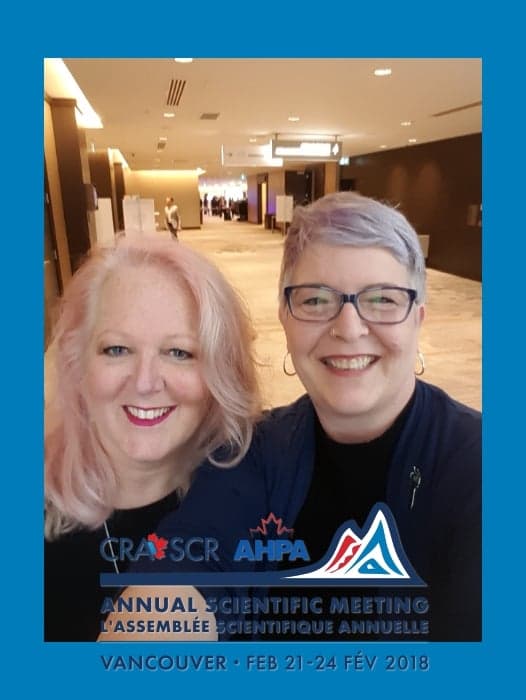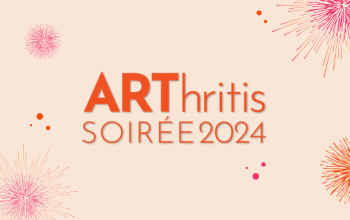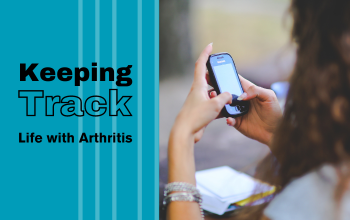News
Everyone’s Arthritis Journey is Different: Shanon McQuitty’s Story
Shanon McQuitty was diagnosed with rheumatoid arthritis (RA) at the age of 48. Before her diagnosis, she knew nothing about this disease. Now, she has taken her personal journey with arthritis and used it to advocate on behalf of others with various forms of arthritis.

Shanon (left) and her sister, Denise (right), at the Canadian Rheumatology Association’s 2018 Annual Scientific Meeting
When did you first notice something was wrong?
In August 2011, I started knitting for Christmas and my index finger started hurting. Over the next couple of months, it started to bend and I still had pain. Then, I couldn’t straighten my finger anymore. The following October, my right knee started to hurt. That’s when I decided to go to the doctor. She ran bloodwork and it came back positive for rheumatoid arthritis (RA).
How has arthritis changed your life?
I stopped working full-time a couple months after I was diagnosed. I switched to freelancing. I was sick and tired. The first year of treatment was tough because it was very aggressive. I would inject my methotrexate and be out of commission for 2-3 days of the week!
How is your everyday life different from a person who does not live with arthritis?
Someone recently invited me to Bard on the Beach. My mind said, “yes”, but my body said “no”. I can’t do as much as I used to. Not everyone understands that. You have to surround yourself with friends who accept that you can’t always be reliable, but will keep asking. You live with a lot of fear and isolation when you have arthritis. There is fear of what will happen in the future, fear of meds failing at some point, and fear around exercise. You don’t want to overdo it because there is a price to be paid for activity. Even if a certain type of exercise doesn’t hurt you when you are doing it, you might still end up in pain later.
What kind of challenges do you face in your daily life?
Fatigue is a really big factor. It stops me from being able to do things. I have learned to be a better planner of activities/tasks that need to get done. I don’t just leave the house for one thing.
How do you deal with the emotions that can come with having arthritis?
I read a really good book called “How to be Sick: A Buddhist-Inspired Guide for the Chronically Ill and Their Caregivers”. It offered some really great tools. There is a saying in the arthritis community: “It’s okay to have a meltdown, but don’t unpack and live there. Cry it out and then refocus on where you are headed.” Isolation isn’t just physical. It’s people not understanding – they want to understand, but they can’t because they don’t have arthritis. You can only really understand if you have a chronic illness of some sort. In the end, everyone with arthritis deals with it by themselves regardless of who is around them.
What kind of support systems do you have? Can you recommend any resources to others?
I had support from the very beginning. My sister, Denise, is a nurse and, before I was diagnosed, she was living in San Diego and caring for a woman who had rheumatoid arthritis. She came home shortly before I was diagnosed. Denise went to all my appointments and stayed overnight with me the first night I injected my methotrexate. I also ended up in the emergency room a couple weeks before my first rheumatology appointment – she went with me. Denise is now my rheumatology nurse. I also connected with someone through a Facebook group during my first year with RA. She lives in Chicago and has had juvenile arthritis since the age of two (40 years). She was at the other end of the computer 24/7. We spoke every day. Now I try to help others with arthritis. I started a Facebook page: BC Rheumatologist Arthritis Support. I have also buddied up patients who live in remote communities. There aren’t many physical support groups. Most people are going online.
How did you go from being a patient to advocate?
I went to the Reaching Out with Arthritis Research (ROAR) public education forum. When I found out patients put it together, I filled out a form to join Arthritis Research Canada’s patient advisory board (APAB) – the group responsible for organizing ROAR – even though I had no idea what APAB did at that time.
If you could tell someone who knows nothing about arthritis why arthritis research is important, what would you say?
I don’t even know because it feels futile. It doesn’t apply to them unless they are directly affected by arthritis. I don’t think they are motivated to learn about it. Maybe not enough people are out about their arthritis. It was brave for Canadian Olympic snowboarder, Spencer O’Brien, to come out about her arthritis. We often don’t find out that a person had arthritis until they are dead. People don’t know that arthritis can cause you to die early. The numbers, the kinds of arthritis and the people who have them – those are the biggest surprises to people. I know someone who had both hips replaced by age 21 (diagnosed at 16). Everyone is different. Just because someone has arthritis – even if it’s the same type – doesn’t mean that they will have the same experience.
There are a lot of misconceptions about arthritis. What misconception do you most want to dispel for people?
I want people to know that arthritis is not just a disease of old people. I would also like people to know that the isolation caused by arthritis is both psychological and physical (especially for people living in rural areas). So anything we can do to improve access to care is important. And I would like to call attention to the difficulty individuals with juvenile arthritis face when they age out of pediatric care. It’s a challenging process – equally as emotional as someone getting diagnosed for the first time.





















































